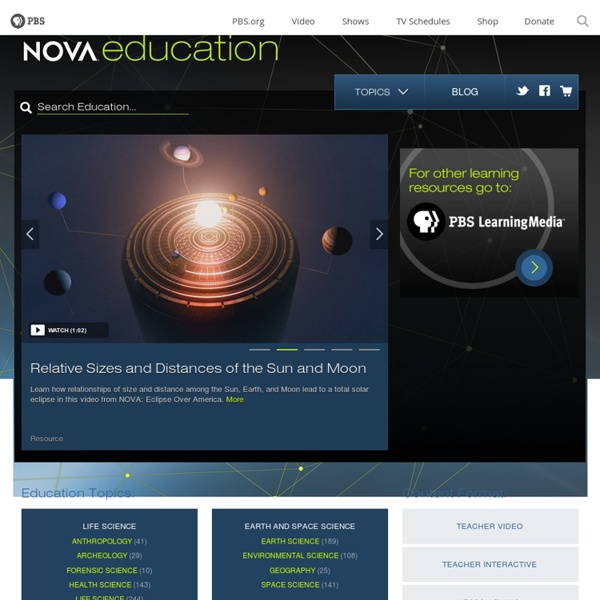NOVA
Why Did NASA Kill Cassini? On September 15, 2017 NASA destroyed Cassini—on purpose. Why kill a multibillion-dollar spacecraft? Sep 20, 2017 Death Dive to Saturn Follow Cassini's final days as it skims the cloud tops before plunging into the planet. Commentary: Unsolicited and Unwelcome, Climate Denial Comes to Schools In mid-March of 2017, I saw the first indications of trouble. From Education Blog | Sep 19, 2017 Cassini's Search For Life Is there life beyond Earth? Sep 15, 2017 Amazing Discoveries from Cassini Relive Cassini's greatest hits from its 13 years studying Saturn. Saying Goodbye to Cassini Cassini, a brave explorer that was dispatched to study a distant ringed world, has died. What Saturn Can Tell Us About Earth—and Beyond After Friday’s crash landing into Saturn, NASA scientists are reflecting on the lessons Cassini has imparted.
Related: Biologi
Virtual Microscope
50 Really Cool Online Tools for Science Teachers
A 21st-century education revolves around the Internet for everything from collaboration, tools, lessons, and even earning degrees online. If you are looking for ways to integrate online learning into your science class or science degree programs, then take a look at these cool online tools that are just perfect for both teachers and students. Science Tools to Use with Students These tools offer opportunities for learning about climate, cells, the human body, nature, and more. ChemiCool. Share this periodic table with your class for an easy to use tool with information on each of the specific elements.GPS Activities and Lesson Plans. AP Tools Whether you are setting up a new AP curriculum or are just looking for additional material to use with your AP science students, these tools will help. Advanced Placement Biology. Websites and Resources for Science Teachers These websites are chock full of amazing resources and tools for science teachers. Discovery Education. Calculators Online Games
InTech - Open Science Open Minds | InTechOpen
Young Makers
9 Tactics for Rapid Learning (That Most People Have Never Heard Of) & Scott H Young - StumbleUpon
Whenever the subject of why some people learn faster comes up, I get a whole host of common answers: Some people are just naturally smart. (Often implying you can’t improve)Everyone is “smart” in their own way. (Nonsense, research indicates different “intelligences” often correlate)IQ is all in the genes. There may be some truth to these claims. Considering the upcoming launch of my rapid learning program, I wanted to share my favorite tactics to learn faster, retain information better or just enjoy the process of learning more: #1 – Pegging (or How Mental Magicians can Perfectly Recall Hundreds of Numbers) One of my favorite learning tactics, that is rarely mentioned, is pegging. The systems I’ve seen typically work with a special cheat sheet. From there, you can translate any series of numbers into a series of letters. Then, once you have your string of nouns, you just need to create a story that combines each of the nouns in a sequence. If you want to speed read, the basics are:
Stone Aerospace • Smart Tools, Systems, and Vehicles for Exploring and Commercializing the Frontier
projects for Exclusively online
Formal Verification is the process of rigorously analyzing software to detect flaws that make programs vulnerable to exploitation. Performing this analysis requires highly skilled engineers with extensive training and experience. This makes the verification process costly and relatively slow. The Defense Advanced Research Projects Agency (DARPA) Crowd Sourced Formal Verification (CSFV) program is interested in improving and advancing the current processes of formal verification by significantly increasing the number of people working on formal verification projects at any given time through crowd-sourcing. CSFV augments the intensive work done by formal verification experts by greatly decreasing the skill required to do formal verification. Much of the work required in the process of formal verification can be automated. CSFV seeks to add more human expertise to the process of formal verification through fun and engaging video games. The five teams involved in the project include:
Welcome - The Richard Dawkins Foundation for Reason and Science
makercamp
Related:




Visitors to the site will immediately notice the "Watch, Interact, Explore" section, which allows interested parties to access short video clips and interactive features culled from NOVA program webpages. The materials here are all tied to state educational standards, and visitors can browse the subject headings, which include anthropology, forensic science, and space science. by macopa Aug 28